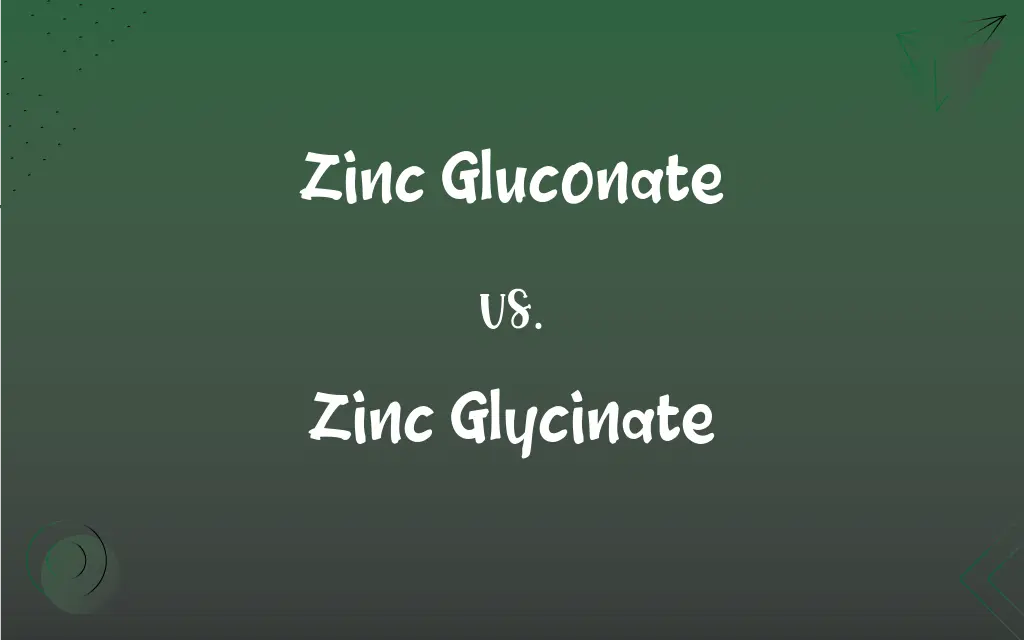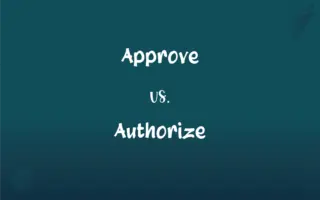Zinc Gluconate vs. Zinc Glycinate: What's the Difference?
Edited by Aimie Carlson || By Harlon Moss || Published on December 22, 2023
Zinc Gluconate is a zinc salt of gluconic acid used in dietary supplements. Zinc Glycinate is a chelated form of zinc bound to glycine, used for better absorption.

Key Differences
Zinc gluconate is a nutritional supplement that provides the mineral zinc in the form of gluconic acid salt. It is commonly used to prevent zinc deficiency and to support immune system health. Zinc glycinate, on the other hand, is a form of zinc where the mineral is chelated, or bound, to glycine, an amino acid, which is thought to enhance its absorption in the body.
Zinc gluconate is known for its relatively good bioavailability and is widely used in over-the-counter supplements and cold remedies. Zinc glycinate is often preferred for its higher bioavailability and is believed to be gentler on the stomach, making it a suitable option for those with sensitive digestive systems.
The chemical composition of zinc gluconate means it dissociates into zinc and gluconate in the stomach, which can influence its absorption rate. Zinc glycinate’s chelated form allows it to pass more easily through the intestinal wall, potentially resulting in better zinc uptake by the body.
In terms of application, zinc gluconate is commonly found in lozenges for cold relief as well as in general supplements. Zinc glycinate, due to its enhanced absorption and gentle nature, is often used in specialized supplements aimed at maximizing zinc intake without gastrointestinal discomfort.
Both forms are effective in providing the body with zinc, the choice between zinc gluconate and zinc glycinate may depend on individual factors like digestive sensitivity and specific health goals, as well as the desired form of the supplement.
ADVERTISEMENT
Comparison Chart
Chemical Form
Zinc salt of gluconic acid
Chelated form of zinc with glycine
Bioavailability
Good bioavailability
Higher bioavailability
Digestive Impact
Generally well-tolerated
Gentler on the stomach
Absorption Mechanism
Dissociates into zinc and gluconate
Enhanced absorption due to chelation
Common Uses
Over-the-counter supplements, cold remedies
Specialized supplements for sensitive digestion
ADVERTISEMENT
Zinc Gluconate and Zinc Glycinate Definitions
Zinc Gluconate
Zinc gluconate is used to prevent and treat zinc deficiency in the body.
The doctor recommended zinc gluconate to address his zinc deficiency.
Zinc Glycinate
Zinc glycinate is known for its high bioavailability and minimal gastrointestinal impact.
Her nutritionist recommended zinc glycinate due to its gentleness on the stomach.
Zinc Gluconate
Zinc gluconate serves as a source of zinc in various pharmaceutical applications.
Zinc gluconate lozenges are often used to alleviate cold symptoms.
Zinc Glycinate
Zinc glycinate supports immune function, skin health, and metabolic processes.
To improve her skin health, she included zinc glycinate in her diet.
Zinc Gluconate
Zinc gluconate is a popular over-the-counter form of zinc in many supplements.
Zinc gluconate is a key ingredient in her daily multivitamin supplement.
Zinc Glycinate
Zinc glycinate is a beneficial form of zinc for individuals with sensitive digestion.
Due to her sensitive stomach, she opted for zinc glycinate supplements.
Zinc Gluconate
Zinc gluconate is known for its role in supporting immune health and wound healing.
After her surgery, zinc gluconate helped in her recovery process.
Zinc Glycinate
Zinc glycinate is often used in supplements for its superior absorption qualities.
Zinc glycinate is a preferred ingredient in high-quality mineral supplements.
Zinc Gluconate
Zinc gluconate is a dietary supplement form of zinc, bound to gluconic acid.
She took zinc gluconate to boost her immune system during flu season.
Zinc Glycinate
Zinc glycinate is a chelated form of zinc that is bound to the amino acid glycine.
He chose zinc glycinate for better absorption and digestive comfort.
FAQs
Is zinc glycinate suitable for people with sensitive stomachs?
Yes, zinc glycinate is often recommended for those with sensitive digestion.
Why is zinc glycinate considered to have higher bioavailability?
Zinc glycinate’s chelated form allows for better absorption in the body.
Can zinc gluconate cause stomach discomfort?
Zinc gluconate is generally well-tolerated but can cause stomach upset in some individuals.
How does zinc glycinate improve zinc uptake?
Its chelation with glycine enhances its passage through the intestinal wall.
What are the common forms of zinc gluconate supplements?
Zinc gluconate is available in tablets, capsules, and lozenges.
Are there any specific health benefits of zinc gluconate?
Zinc gluconate supports immune function, wound healing, and may reduce cold symptoms.
What is zinc gluconate primarily used for?
Zinc gluconate is used as a dietary supplement for zinc supplementation and immune support.
Can zinc gluconate be used in cold remedies?
Yes, zinc gluconate is often used in lozenges for cold relief.
Why choose zinc glycinate over other zinc forms?
It's chosen for its absorption efficiency and gentleness on the digestive system.
What differentiates zinc glycinate from other zinc supplements?
Zinc glycinate's binding with glycine for better absorption and minimal digestive impact.
Who should consider taking zinc gluconate?
Individuals looking for a standard zinc supplement for general health.
Is zinc glycinate more expensive than zinc gluconate?
Zinc glycinate may be slightly more expensive due to its enhanced bioavailability.
How does the body process zinc gluconate?
It dissociates into zinc and gluconate in the stomach, which can influence absorption.
What is the recommended dosage for zinc gluconate?
Dosage depends on individual needs; it's best to follow the label or healthcare provider’s advice.
What specific health issues does zinc glycinate target?
It targets overall immune health, skin conditions, and supports metabolic processes.
Is zinc gluconate effective in boosting the immune system?
Yes, it is effective in supporting immune health.
How long should one take zinc glycinate supplements?
Duration depends on individual health goals and should be determined by a healthcare professional.
Can zinc gluconate be taken on an empty stomach?
It can be, but taking it with food may reduce the risk of stomach upset.
Can zinc glycinate interact with medications?
Like all supplements, it can interact with certain medications; consultation with a healthcare provider is advised.
Does zinc glycinate have any side effects?
Zinc glycinate is generally well-tolerated, though excessive intake can lead to side effects.
About Author
Written by
Harlon MossHarlon is a seasoned quality moderator and accomplished content writer for Difference Wiki. An alumnus of the prestigious University of California, he earned his degree in Computer Science. Leveraging his academic background, Harlon brings a meticulous and informed perspective to his work, ensuring content accuracy and excellence.
Edited by
Aimie CarlsonAimie Carlson, holding a master's degree in English literature, is a fervent English language enthusiast. She lends her writing talents to Difference Wiki, a prominent website that specializes in comparisons, offering readers insightful analyses that both captivate and inform.































































